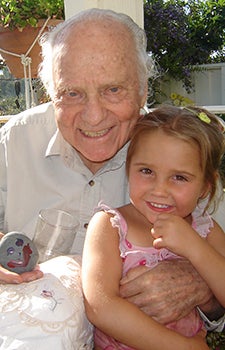In Memoriam: Gerald “Gerry” Larue, 98
Professor emeritus Gerald “Gerry” Larue, a 23-year faculty member in the USC Dornsife School of Religion and founder of USC’s Archaeological Research Collection, has died. He was 98.
Larue died after a stroke on Sept. 17 in Newport Beach, California.
Many said Larue put material culture on the map at USC Dornsife, long before the field entered mainstream academia.
“The archaeological collection that Gerry created was the foundation for generations of USC Trojans to gain a direct experience of the ancient past,” said Lynn Dodd, associate professor of the study of religion and director of the interdisciplinary archaeology undergraduate major. “In almost every class, I bring in objects Gerry brought back from the Middle East, and many students have discovered things that weren’t previously known about the ancient world.”
Larue joined USC in 1958 as a professor of biblical history and archaeology. His textbook Old Testament Life and Literature (Allyn and Bacon, 1968) was nationally recognized and augmented by his expertise in archaeology.
In the 1960’s, Larue led students on many trips to what is now Israel’s West Bank, excavating artifacts that went back to the Middle Ages through the Roman Empire. He negotiated with the Israeli government and garnered funds to establish USC’s own archaeological site in Khirbet Mazra’a.
As a religious scholar, Larue is remembered for using the Bible to provoke thought and improve people’s lives.
“My father truly cared about people and their feelings,” said Larue’s son David. “He was an ethically oriented person.”
However, Larue became known as a subversive bible scholar for being a self-proclaimed agnostic who wrote or co-wrote books such as Sex and the Bible (Prometheus Books, 1983)and Playing God: Fifty Religions’ Views on Your Rights to Die (Moyer Bell, 1996).
“My father wrote one particularly dramatic article pointing out that, although the Bible says homosexuality is a sin, Jesus states that if you divorce and remarry, you’re an adulterer,” David Larue said. “Today, few people think of divorced people as being sinners, yet many still believe that homosexuality is a sin based on passages in the Bible. My father’s point was that it is unfair to pick and choose your ethical beliefs from the Bible, and also that what is considered a sin changes as society evolves.”

The religious scholar enjoyed spending time with his granddaughter Susan, now 11. Photo courtesy of David Larue.
Larue was born on June 20, 1916 in Calgary, Canada. He received bachelor of arts and bachelor of divinity degrees from the University of Alberta, Edmonton — where he earned the moniker, “Heretic Larue,” — “which turned out to be a harbinger of things to come,” David Larue said.
From 1945 to 1953, Larue was minister with the United Church of Canada, serving pastorates in Canada and the United States. He later moved to California to pursue a doctor of theology degree at the Pacific School of Religion, in Berkeley, California, where he also studied archaeology.
Larue eventually became known as a humanist — someone who embodies nontheistic views, while at the same time touting ethics and rational thought. He received the Humanist of the Year Award from the American Humanist Association in 1989.
Larue is perhaps best known publicly for devising an elaborate hoax in which his friend George Jammal claimed that he had found Noah’s Ark on Mt. Ararat in Turkey. The forged discovery was featured on a 1993 CBS documentary titled, “The Incredible Discovery of Noah’s Ark.”
“Once the program aired, then Gerry let them have it,” said Bruce Zuckerman, professor of religion and director of the USC School of Religion and the USC Archaeological Research Collection.
“I called Gerry up after the show aired, and he was just gleeful. He didn’t want anyone to make outlandish claims that couldn’t be confirmed by historical evidence,” said Zuckerman, who founded and oversees the West Semitic Research Project, and is the Myron and Marian Casden director of the Casden Institute for the Study of the Jewish Role in American Life.
One week later, Larue revealed the entire plan in an interview with Time magazine.
David Larue’s wife, Susan Rempel, Gerald Larue’s teaching assistant, attended the professor’s undergraduate course on the Old Testament at USC Dornsife.
“He asked for his students’ perspectives on various stories — and then he would challenge them,” Rempel said. “He never expected students to change their beliefs, but he wanted to get them to be independent thinkers.”
After retiring from the USC School of Religion in 1981, Larue taught at the USC Davis School of Gerontology for 25 years. He was a longtime proponent of the “Death with Dignity” movement and gained recognition for his popular course “Death and Dying.”
In 1980, Larue became founding president of the Hemlock Society (Death with Dignity). Named for Greek philosopher Socrates’s decision to consume a lethal dose of hemlock rather than be exiled in disgrace, the society seeks legislation to support assisted suicide for patients who are terminally ill. In 2004, Larue received a Leibovitz Award for Distinguished Volunteer Service to Seniors.
“My father’s career was a phenomenal journey in which he went from a fairly conservative Protestant ministry to being an outspoken agnostic in the secular humanist movement,” David Larue said. “However, he always argued with me that even in the ministry he didn’t believe in or disbelieve in God — instead he thought that religion would be a better way to help people by teaching faith.”
Larue is survived by his son David and grandchildren Susan and Gerald Alexander.